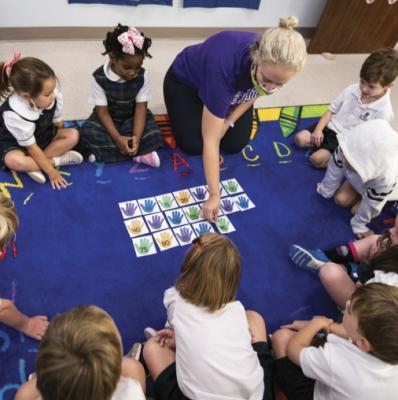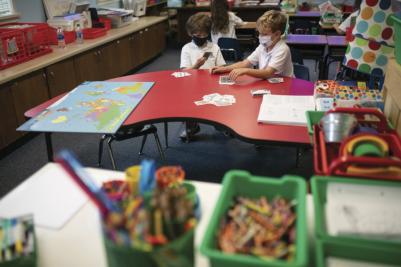Challenges and Silver Linings

Reflections on a Year of Pandemic Teaching
Nearly all professional reading that comes my way from journals and online involves the impact of the Covid-19 pandemic upon children and learning. There are articles on reading scores, social-emotional learning and student anxiety levels. There are also studies of teacher burnout and parental frustration. Some of the literature is focused upon students who were primarily or exclusively virtual learners. Still other studies focus on those students who, like most of the public and private school students of northwest Louisiana, attended much of the year in live or hybrid formats but with pandemic protocols that significantly affected both the social and academic experiences of school.
 Despite the wide range of student experiences across the country, it is clear that the pandemic has significantly affected all children, teachers and parents in some ways. These effects are likely to have an impact for years to come.
Despite the wide range of student experiences across the country, it is clear that the pandemic has significantly affected all children, teachers and parents in some ways. These effects are likely to have an impact for years to come.
My personal experience certainly supports the reports and studies I read. Although St. Mark’s was successful in managing virtual learning during spring of 2020 and was able to offer live instruction for the entire 2020-21 school year, we found that students had lost both academic and social skills during the lockdown and ensuing summer.
Teachers had to revise and reassess plans to make sure we addressed those gaps. Masks are tiresome and uncomfortable in the classroom and make teaching phonics, social skills and foreign languages much harder. Even the most tech-savvy of teachers found managing simultaneous virtual and live instruction to be challenging.
I think it is safe to say that in over 30 years of education, I have never seen teachers so exhausted and in need of summer vacation as this past May and that students, teachers and parents all hope for a more normal year.
Despite these challenges, educators are fundamentally optimists and strive to learn and grow from whatever they experience. In one Zoom conference with Episcopal school heads, I heard another head of school say that he had created a “Silver Linings Committee” to help his faculty focus on the good that has come out of the pandemic.
In our end-of-year meetings at St. Mark’s, we discussed not only those things we hoped not to have to do in the coming year but, even more importantly, what had gone really well and that we might want to keep for the coming year.
Some “silver linings” included gaining technology skills that could prove very useful even without a pandemic and successfully reconceiving traditional special events in ways that met Covid protocols yet were often better than the original. But the universal silver lining that teachers of all age groups noted, and that heads of other schools with whom I have talked have also noted, was the increased independence and agency demonstrated by students.
Pandemic protocols at nearly every school in the country prevented or significantly limited the ability of parents to enter the school building. At St. Mark’s, that meant children as young as 2 walked into school without their parents, and parents were only inside for scheduled meetings in spaces with no students present.
Our teachers noted that preschool students exhibited significantly briefer and less intense parental separation anxiety than when parents walked their children into the classroom. Likewise, preschool students became more adept at putting away lunches, taking off jackets and starting their classroom morning arrival routines with minimal direction.
Lower school teachers noted similarly improved self-help and selfmanagement skills in their students.
Upper elementary and middle school students demonstrated improved homework management skills and a greater ability to advocate for themselves when struggling with subjects or overwhelmed by life circumstances. Social conflict and friendship issues were generally less intense and resolved themselves with less adult intervention as students sorted things out for themselves.
Before the pandemic, a common topic in articles and workshops was how to develop grit or resilience in students. Learning how to persevere in adversity and recover from failure are essential skills for collegiate and career success. Adults must know how to adapt to new challenges, learn from experience and advocate for themselves amid challenges. Counterintuitively perhaps, both my colleagues at St. Mark’s and peers at other schools saw a significant increase in these very skills over the past year of Covid.
While none of us would ever desire a pandemic, nor do we wish to continue barring parents from our schools, the experience of this past year is instructive. Our students can solve many – not all, but many – problems for themselves when given the opportunity. As we hope to move toward a postpandemic school year, the question for educators is how to foster the silver linings of self-agency and resilience that emerged while also working to restore the sense of community that most schools lost this past year. We know that we must work together to overcome the educational losses imposed by Covid, but I hope that we can also work together to nurture those unexpected gains that emerged as well.
